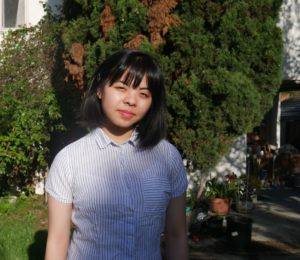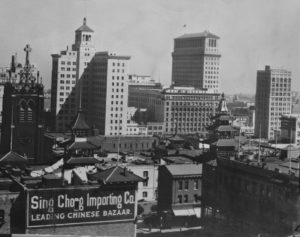
Miranda Jiang is an Undergraduate Research Apprentice at the Oral History Center of The Bancroft Library at UC Berkeley. She is a UC Berkeley history major graduating in Spring 2022.
In the fall of 2019, I joined an undergraduate research apprenticeship on oral history performance with Oral History Center interviewers Amanda Tewes and Roger Eardley-Pryor. Though I’d had some previous experiences with oral history, I wasn’t entirely sure what oral history performance was. I had my speculations: I was familiar with The Laramie Project and some other full-length plays which drew from oral histories. But no matter what the form of the performance would be, I understood that the project would take an approach to history that prioritized and shared the voices of ordinary people.
During the first few weeks of the semester, we discussed readings that fleshed out my understanding of oral history, then introduced me to multiple forms of oral history performance. Through readings such as Lynn Abrams’s Oral History Theory and Natalie Fousekis’s “Experiencing History: A Journey from Oral History to Performance,” I learned that the process of creating an oral history involves both the interviewer and the narrator (the person being interviewed). An oral history is a conversation. Both participants contribute to the content and direction of an oral history, and thus how an experience gets told. Oral history performance presents these experiences to the public, and places the experiences of multiple narrators in conversation with each other.
With these readings and assignments in mind, I searched through the Oral History Center’s vast archive of interviews to find sources for my own oral history performance. The only criteria I initially had in mind were that the subject I chose should be a story I knew little about, that I felt was undertold, and was centered in the Bay Area. I read interviews from the Freedom to Marry Project and the Suffragists Oral History Project, ultimately deciding on the Rosie the Riveter Project. It included interviews from people of African American, Chinese, Japanese, indigenous, and other backgrounds, and it was centered around the Bay Area.

I eventually decided to focus this performance on Chinese-American experiences in the Bay Area. I hoped that by focusing on this one group, I could have more time to flesh out the details of their lives. I do not have my own living grandparents to speak to, so hearing these stories about what young Chinese-American people like me had experienced growing up in California in the 1920s to 1950s made me feel connected to people who lived nearly a century ago. Hearing them also made me realize just how varied our experiences were.
Over the next weeks, I compiled a large annotated bibliography of quotes from relevant interviews, highlighting themes which continuously reemerged. In the spring semester, Amanda, Roger, and I shared many conversations about what it means to create a cohesive script out of direct quotes from oral histories. When we chose which quotes to group together, which to place in conversation with each other, and how we ordered and extracted quotes, we were interpreting each quote’s meaning. We constantly thought about how to assemble a script that highlighted common themes in the experiences of Chinese Americans, without taking narrators’ words out of context or imposing our own interpretations onto the quotes and our audience.
I soon found that by placing quotes of similar subjects next to each other, meaningful similarities and contrasts revealed themselves on their own. For example, many of the interviewers asked if the narrators had experienced teasing as children. Alfred Soo, Dorothy Eng, and Theodore Lee all described growing up in neighborhoods where they were among the only Chinese people there. Soo, who grew up in Berkeley in the 1920s, did not recall any teasing from other children. Lee, who grew up in the 1930s in Stockton, described not being treated any differently, emphasizing the lack of “snobbery” among working-class white people. Eng, who grew up in Emeryville in the 1920s, described being persistently mistreated by kids and teachers throughout grammar school. As a Chinese American who encountered racial insensitivity in school in the early 2000s, I expected that stories of children who grew up in the “age of exclusion” (1882-1943) would easily reinforce my own experiences. And yet, these oral histories showed a more complicated reality than I anticipated.
Another primary goal of this performance is to point the general public towards reading the full transcripts of the interviews. In the final script, there is a quote from Royce Ong, who states that he “just [eats] regular American food.” When I first read this, I was amused and annoyed by how he discounted Chinese food as something strange, when it was his own culture. But reading more of the interview, I found that his comments revealed more about his unique creation of a Chinese-American identity. He discussed “Chinese American” and “Chinese” as very distinct identities, with different political interests. To Ong, he could be a proud Chinese American as someone who didn’t eat Chinese food and who also learned only English as a first language.
Working on this performance made clear that no universal set of criteria comes with identifying as Chinese American. It made me aware of the vast multitude of experiences of other Chinese Americans, which are different from my own and different from each other. The format of the script brought the diversity of Chinese and American life to the forefront, and allowed each narrator to speak about their experiences as they occurred. It was up to the audience to observe and consider the contradictions between quotes.
The final script I created acknowledges that different Chinese Americans had unique experiences, while also highlighting similar struggles and activities within the ethnic group. Many anecdotes are relatable to me, today, and to other Chinese Americans in 2020. And ultimately, while some narrators leaned more towards embracing American culture, and others more towards also preserving Chinese traditions, all of them expressed the same conflicts with identity as Chinese people living in California.
By mid-March, we had created a final draft of the script after many sessions of cutting, rearranging, and reading out loud. We initially planned to give the eight-minute performance at the April 29th Oral History Commencement in the Morrison Library, with four or five student performers of Chinese-American backgrounds. When the campus closed due to COVID-19, we switched to an online podcast format, with the same script and number of performers.
The podcast version will be available on The Berkeley Remix this summer. I’m excited to be able to share this performance with more people using the magic of the Internet. I hope you’ll stay tuned for more!